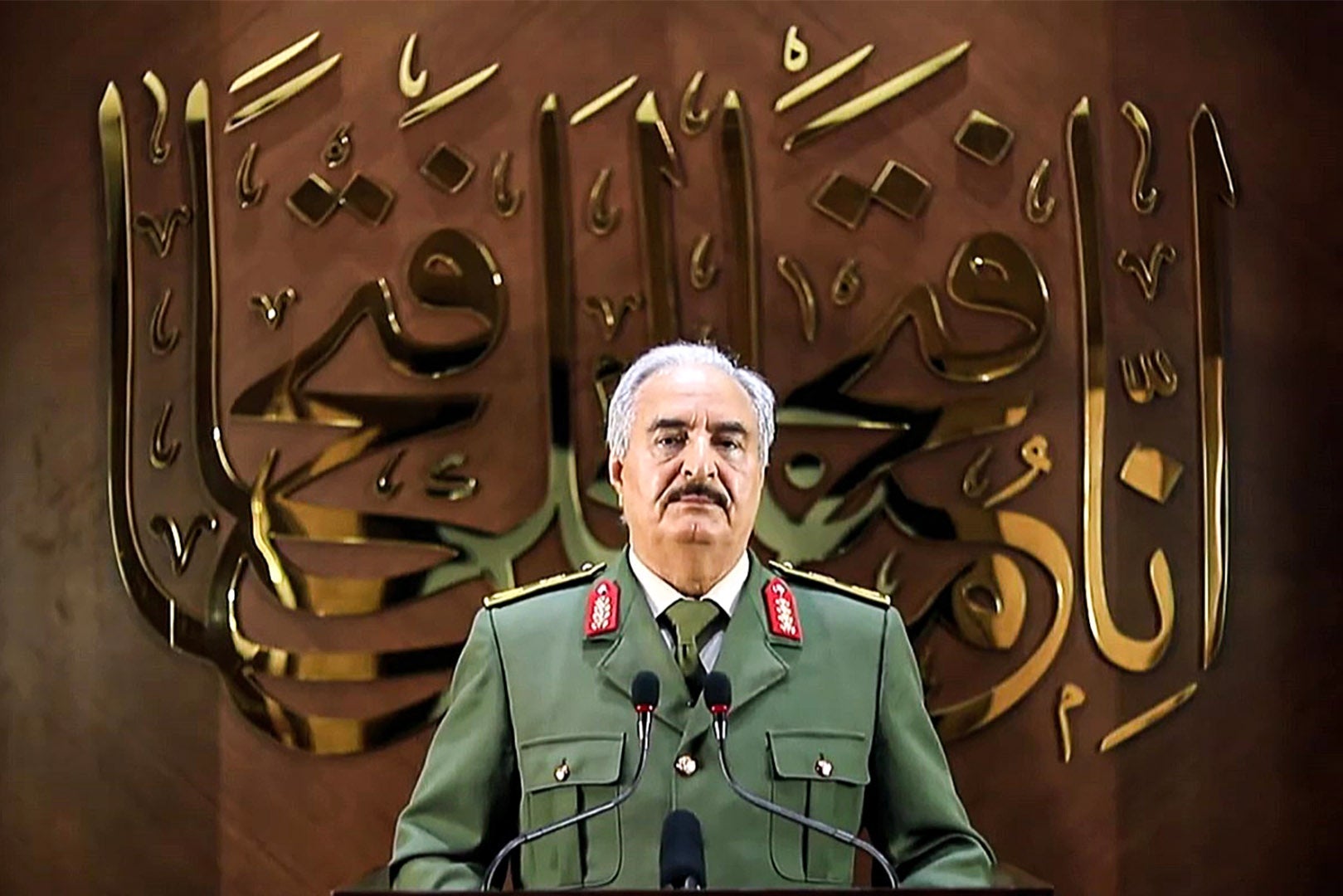‘A game-changer in every sense’: Libya warlord Khalifa Haftar loses key airbase to forces allied with Turkey
Victory boosts Turkey’s presence in north Africa, writes Borzou Daragahi

Forces loyal to the internationally recognised government in Libya, backed by Turkey, have seized control of a strategic airbase to the southwest of the capital, Tripoli, from the renegade warlord Khalifa Haftar.
The United Nations-endorsed Government of National Accord (GNA) announced the predawn capture of the al-Wattiya airbase after six weeks of intense fighting.
Video showed fighters zooming into the desert airbase past fortified bunkers and the carcasses of destroyed planes as dawn was breaking, cheering “Allahu akbar”, or ‘God is great.’ In other footage, young fighters in T-shirts could be seen making off with boxes of ammunition left at the base.
The sprawling site, located about 160km (100 miles) west of Tripoli and under Mr Haftar’s control for the last five years, has been a key element in the year-long attempt to seize the capital by the one-time CIA asset. Its loss will diminish his and his Gulf backers’ ability to launch airstrikes on Tripoli and to resupply fighters currently surrounding the capital.
“It’s massive, it’s huge,” said Anas el-Gomati, an analyst at the Sadeq Institute, a Libyan think tank. “It’s a game-changer in every sense of the word. It changes the entire logistical calculation for Haftar.”
Fayez al-Sarraj, the prime minister of the UN-backed government, said in a statement the base had been captured from the grip of “criminal militias”.
“Today’s victory does not mark the end of the battle,” he said. “Rather, it brings us closer to the big day of victory by liberating all cities and regions and permanently eliminating [Haftar’s] project of domination and tyranny.”
A deputy of Mr Haftar downplayed the loss, saying his forces withdrew without a fight, claiming that the base was no longer used by his forces even though they had been regularly launching airstrikes from the facility. “The armed forces withdrew from the Wattiya base, after vacating it completely and after the Turkish battleships and airstrikes,” he said on condition of anonymity. “It was not a loss, because the Wattiya airbase has been out of service for a long time. It is not a strategic location. There is no benefit from it.”
Backed by the United Arab Emirates, Saudi Arabia, Egypt and Russia – and with the tacit diplomatic support of France and the White House, Mr Haftar had been winning the conflict until six months ago, when Turkey intervened on behalf of the GNA in Tripoli with sophisticated weapons, highly trained personnel, and Nato-calibre battle tactics and discipline.
They don’t want to cut him down to size. They want to eradicate him as a problem
The loss of al-Wattiya, coming on the heels of losses along the Libyan coast and near Misurata, severely restricts the eastern-based commander’s potential footprint in the country’s west.
Now, only the city of Tarhouna, south of Tripoli and besieged by GNA forces, remains as a pro-Haftar bastion in the west. GNA forces will make seizing it their next objective.

The defeats for Mr Haftar also saw him lose two Russian-made Pantsir S-1 air defence systems in al-Wattiya and another in the central Libyan city of Sirte. Video showed GNA fighters celebrating the capture of one of the units, supplied by the UAE and valued at about £10.9m ($14m) each.
Military analysts speculate that Ankara will deploy sophisticated air defence systems to al-Wattiya and begin using it to fly supplies and heavy weaponry, and transform it into the first Turkish beachhead in North Africa, similar to the Turksom base established in Somalia.
Control of the base will probably nudge Tunisia and Algeria, which lie nearby and which Ankara diplomats have been courting, to take Turkey more seriously as a player in the Maghreb.
The possibility that the capture of al-Wattiya could lead to peace talks that would end the Libyan conflict remains remote. In addition to seizing Tarhouna from pro-Haftar militias, GNA forces will now probably begin eyeing oil infrastructure to the south of Libya and towards the east that is under the former Libyan army officer’s dominion.
Despite calls by the international community for a negotiated settlement or at least a humanitarian truce during the coronavirus pandemic, the war appears to be escalating, with reports of scores of planes full of military material from the UAE arriving to replenish Mr Haftar’s forces in eastern Libya.
In the past Mr Haftar has dismissed the Sarraj government as too weak for a deal, arguing that his lack of control over western armed forces made him an inappropriate partner for peace. But Mr Haftar’s sabotaging of impending 2019 peace talks in the city of Ghadames has made his rivals sceptical about his willingness to compromise.
“There is very little appetite on both sides for negotiation,” Claudia Gazzini, Libya specialist at the Crisis Group, told The Independent.
“The more the war goes on and the more Tripoli feels emboldened, the more Turkey feels it doesn’t need to go to negotiations,” she said. “They’re banking on the idea that simply by being able to sustain the conflict will create an implosion within the ranks of those supporting Haftar, create divisions among his international backers, and allow them to wait for a better geopolitical setup globally.”
A sizeable group of Libyans in the west, including thousands displaced by Mr Haftar from the eastern cities of Benghazi and Derna, are girding to eliminate the 76-year-old from the country’s political scene.
“They don’t want to cut him down to size,” said analyst Mr Gomati. “They want to eradicate him as a problem.”
Bel Trew contributed to this report.
Join our commenting forum
Join thought-provoking conversations, follow other Independent readers and see their replies
Comments